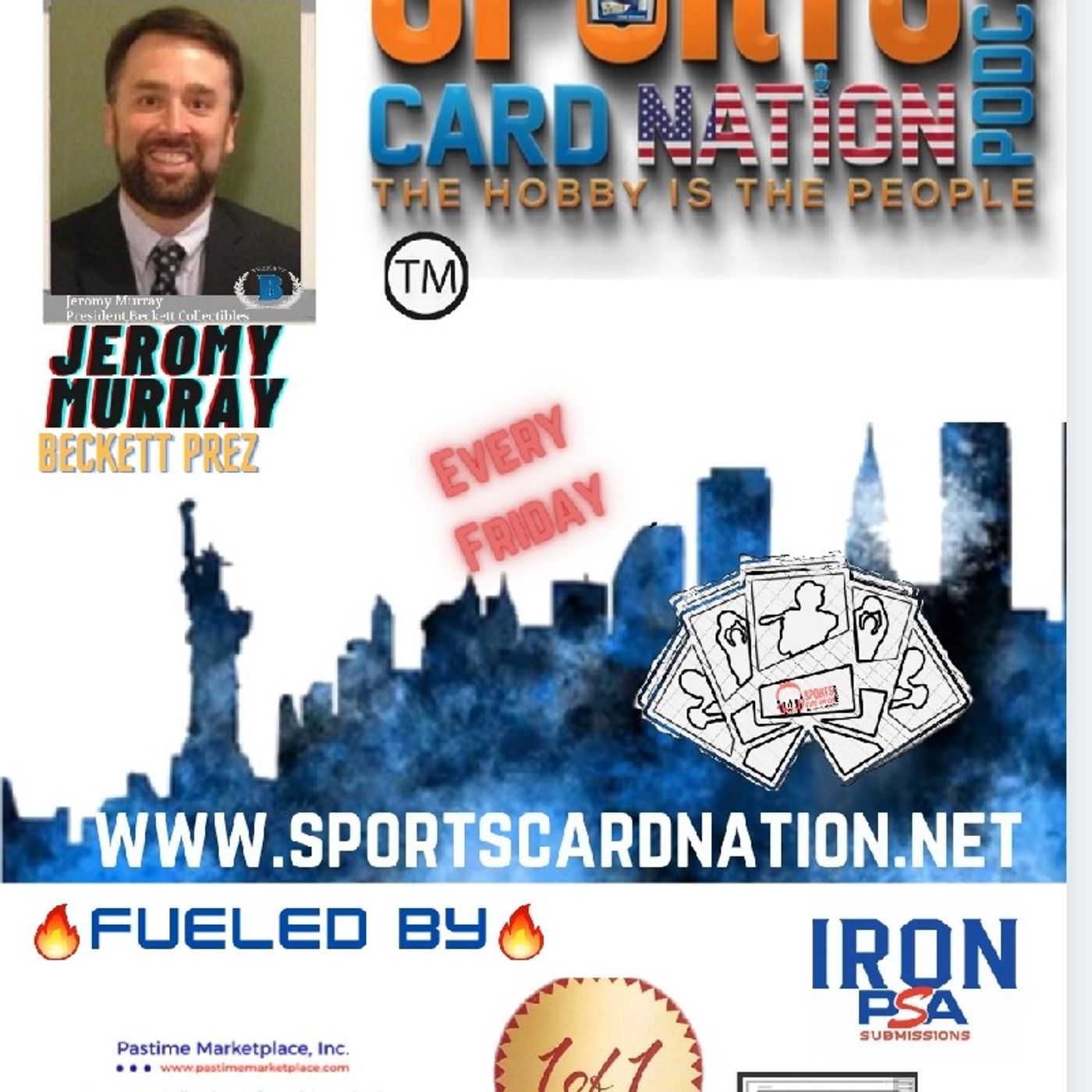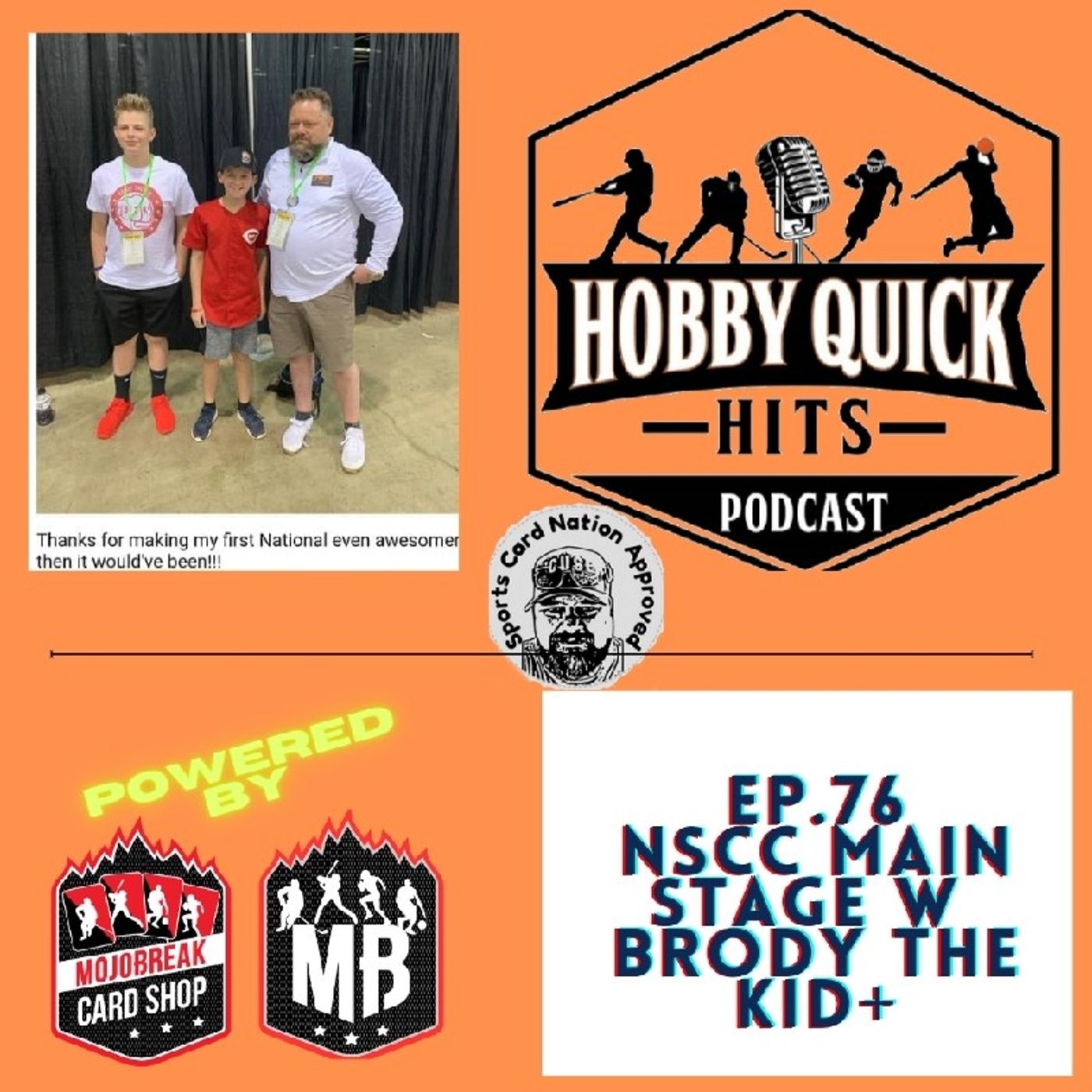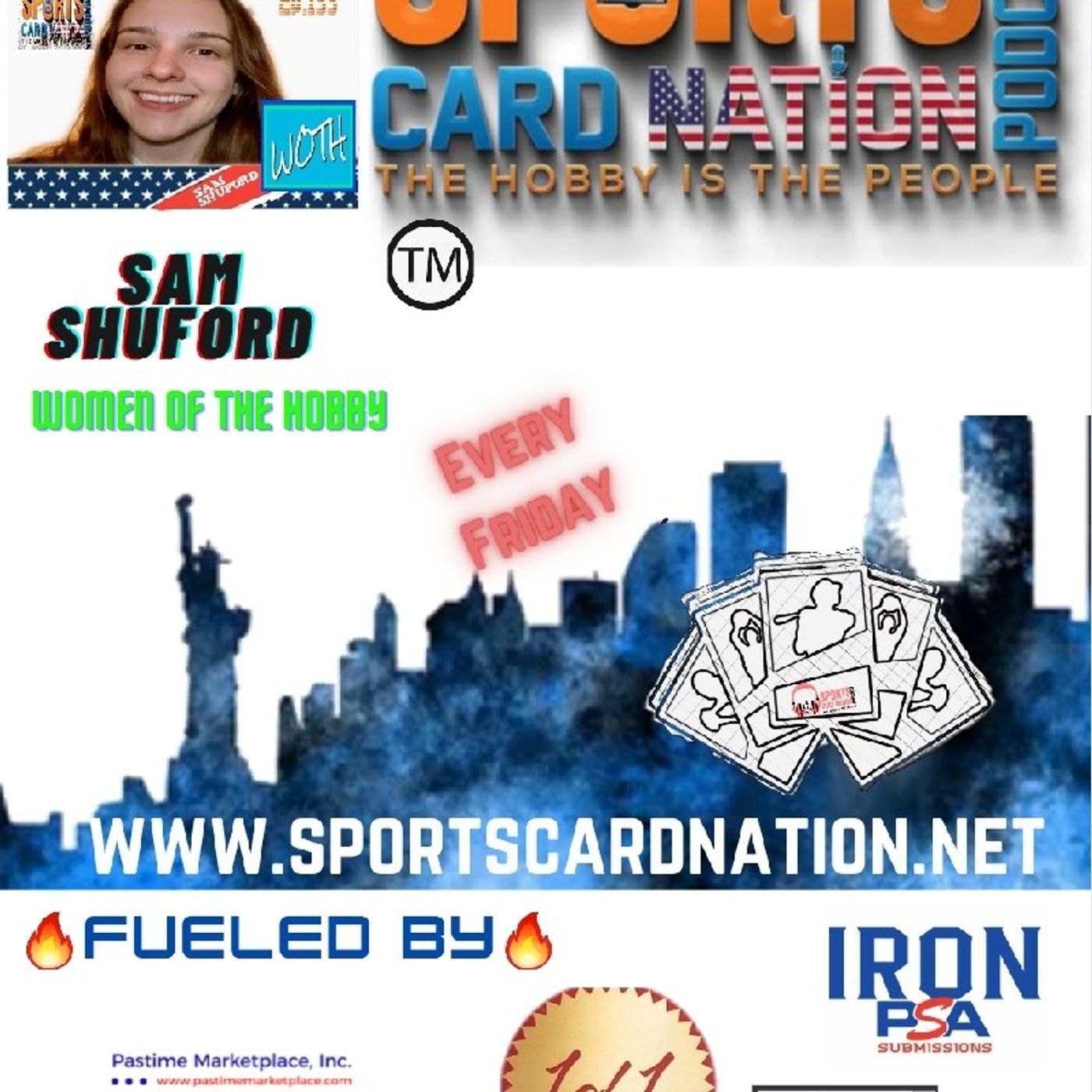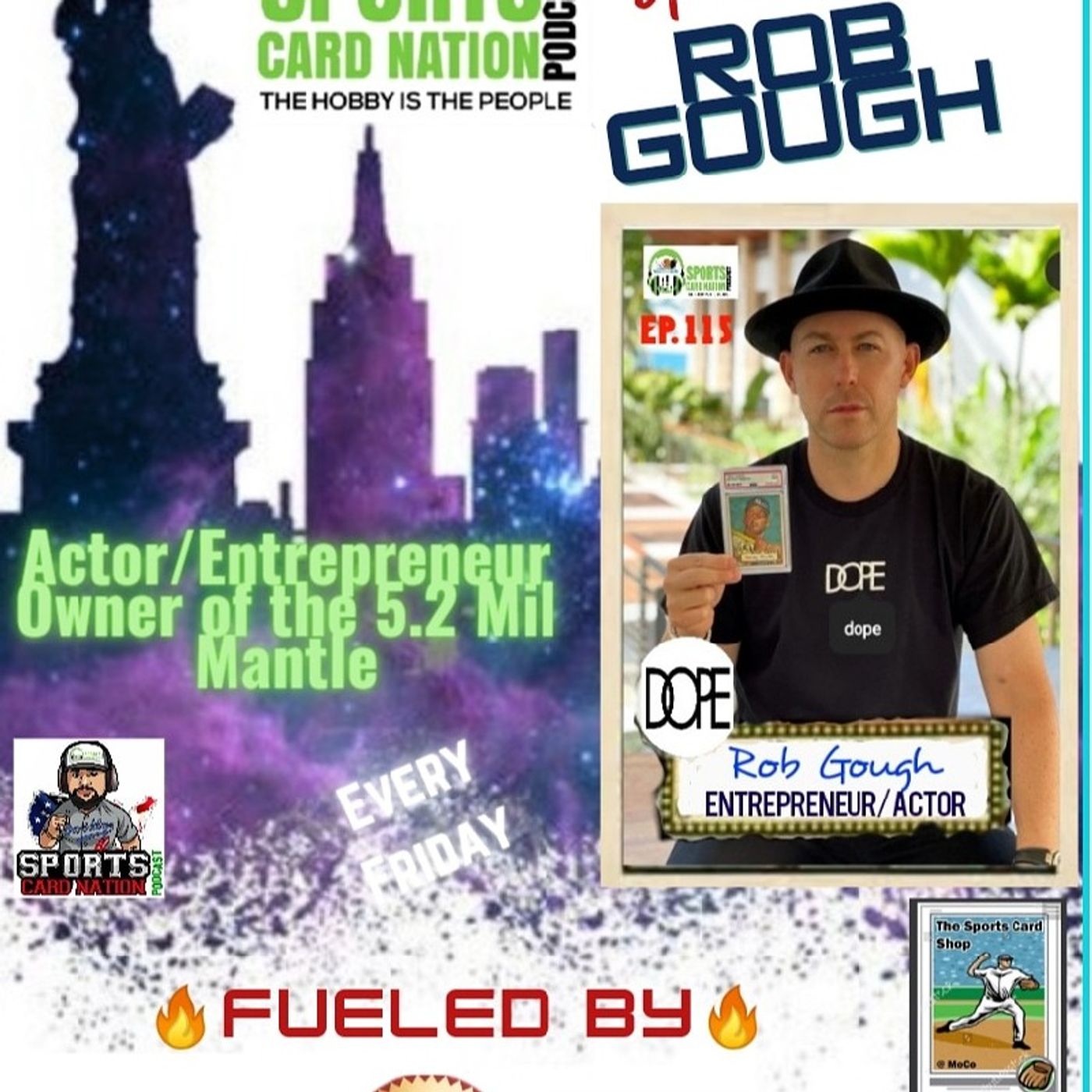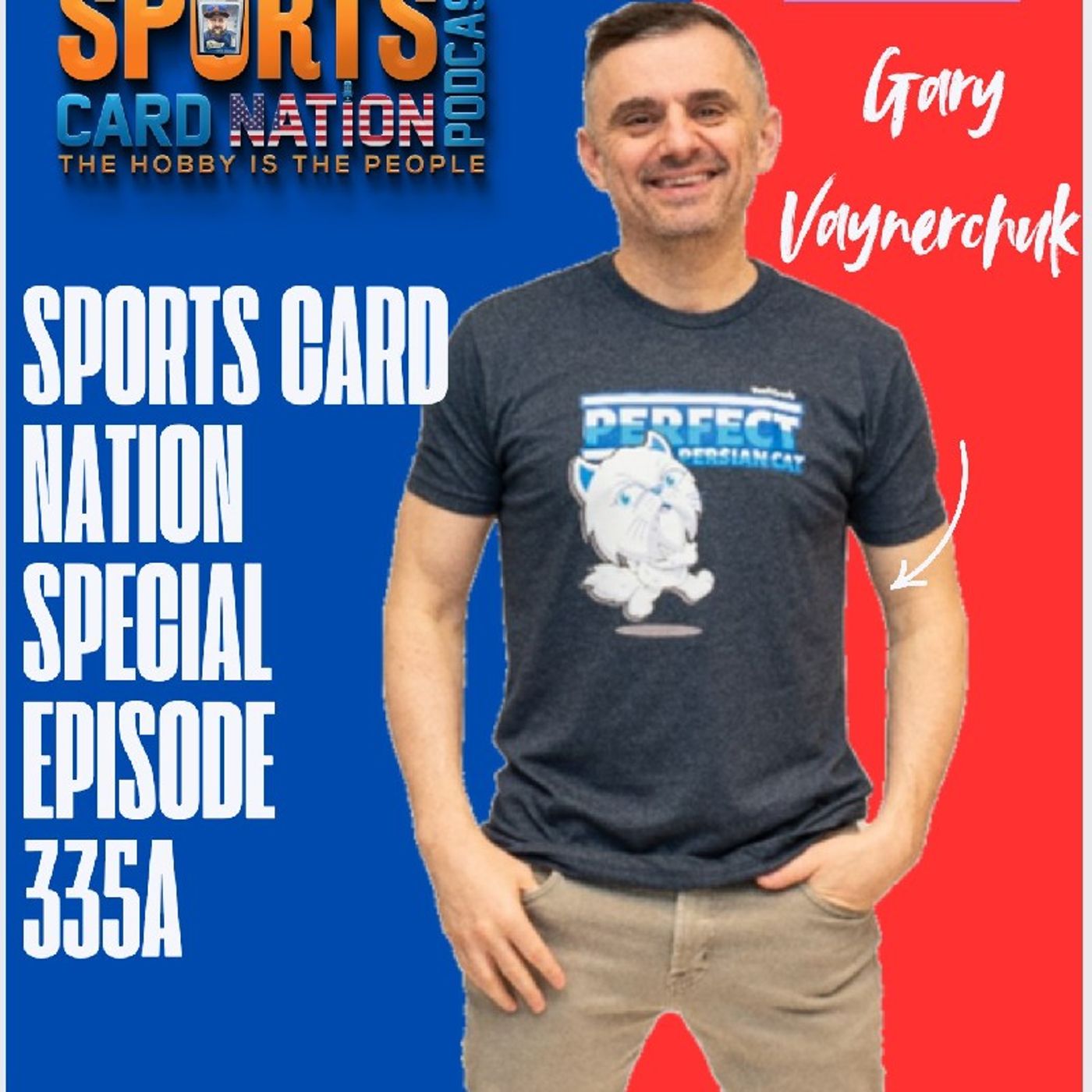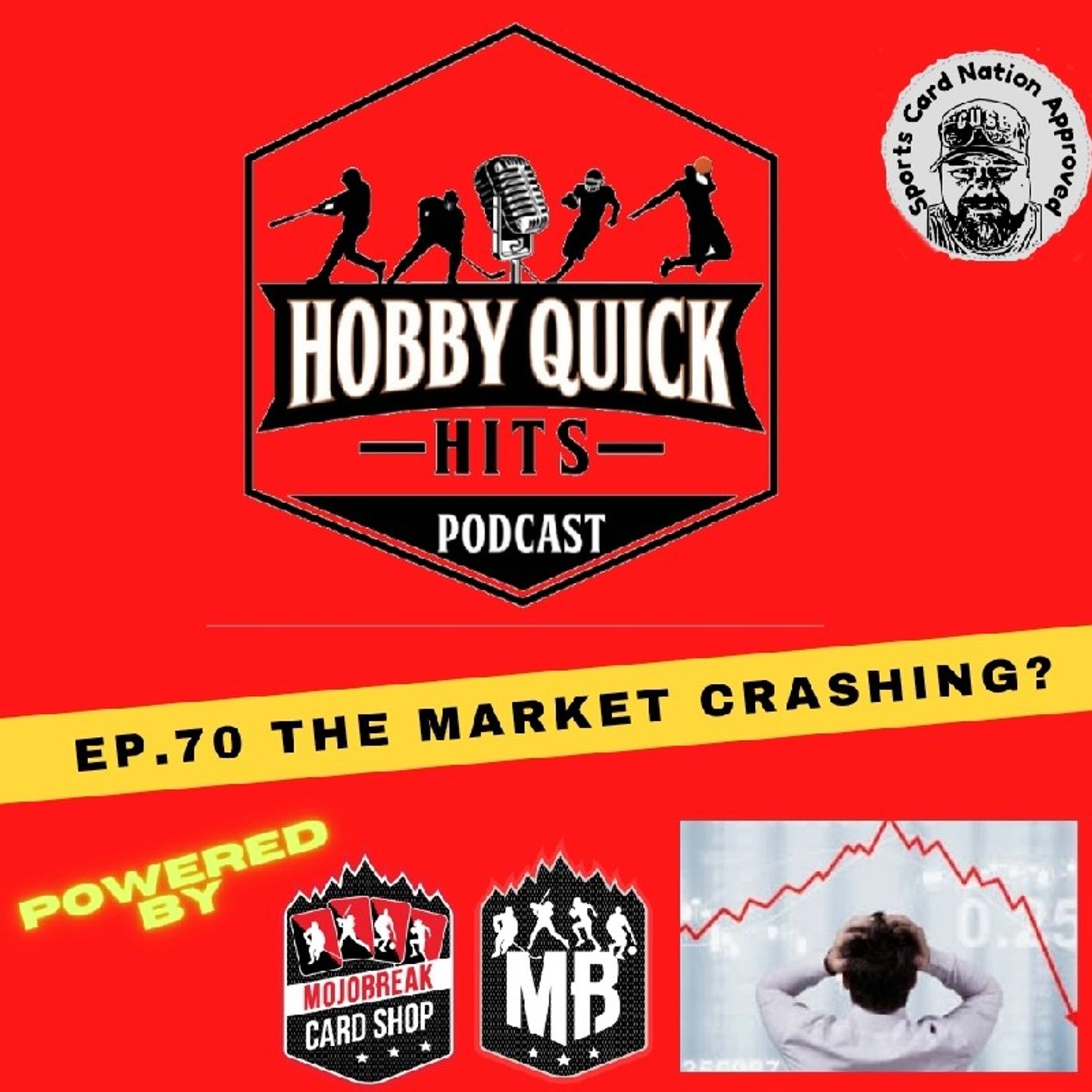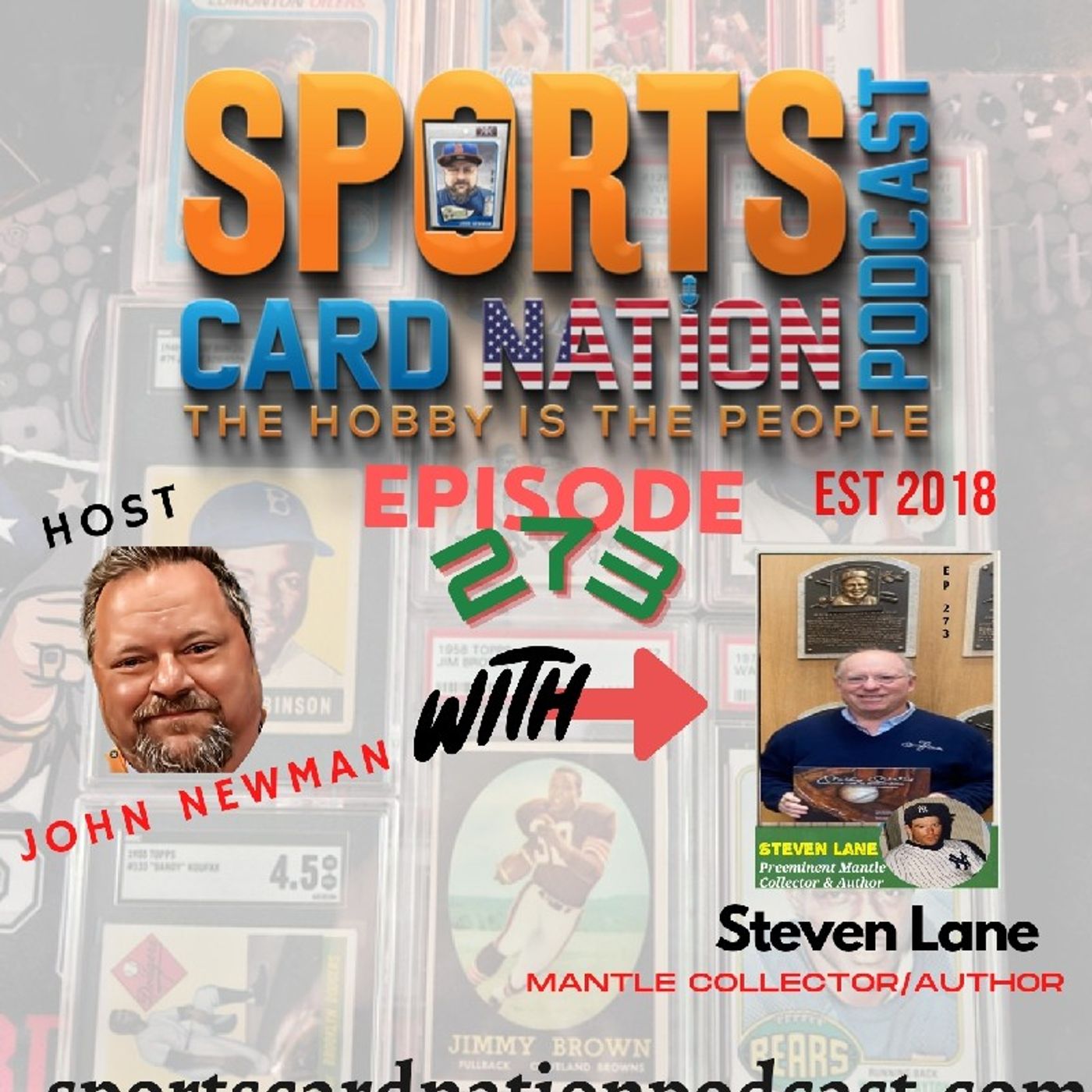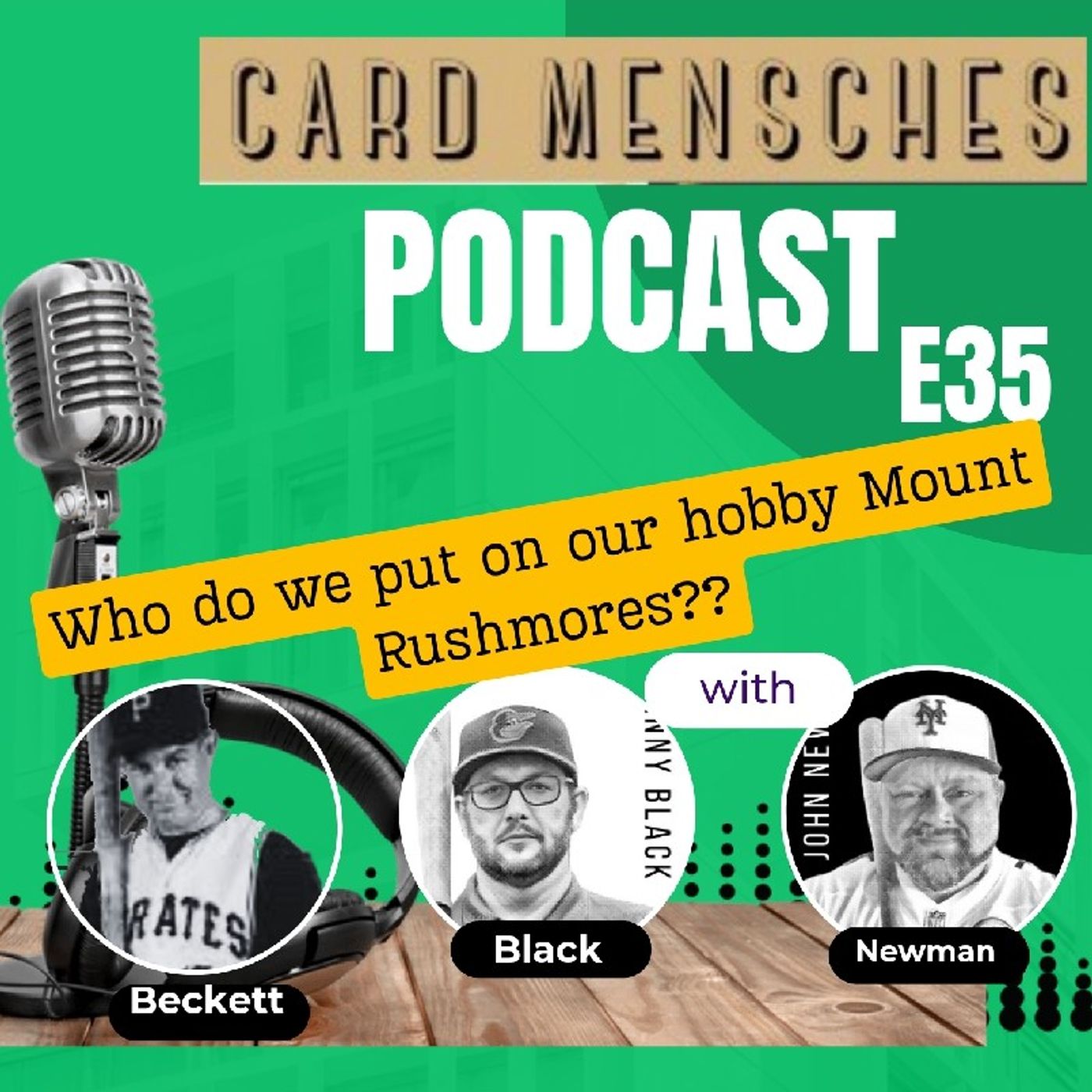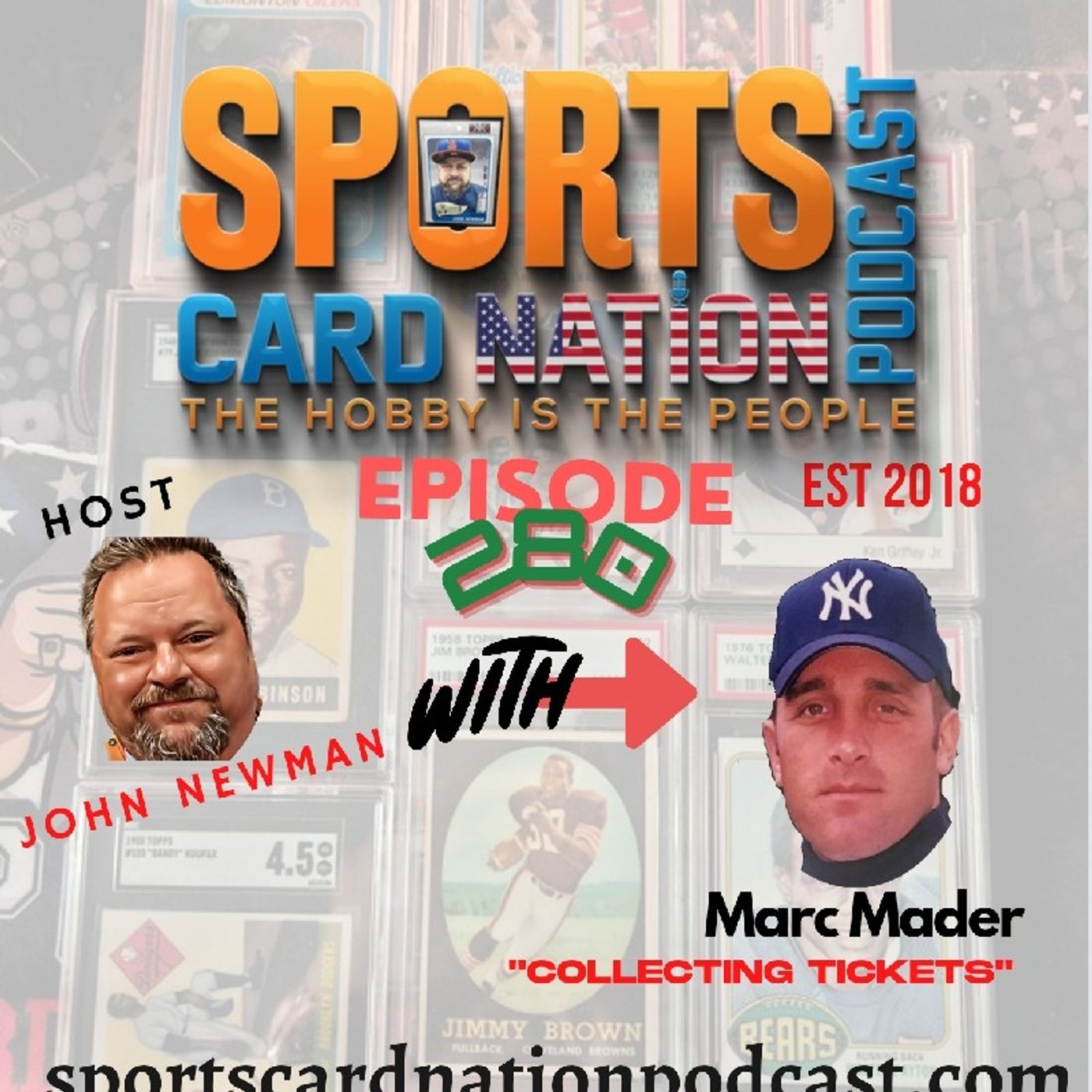Ep.283 w/ Adam Gellman of Sports Card Uncensored
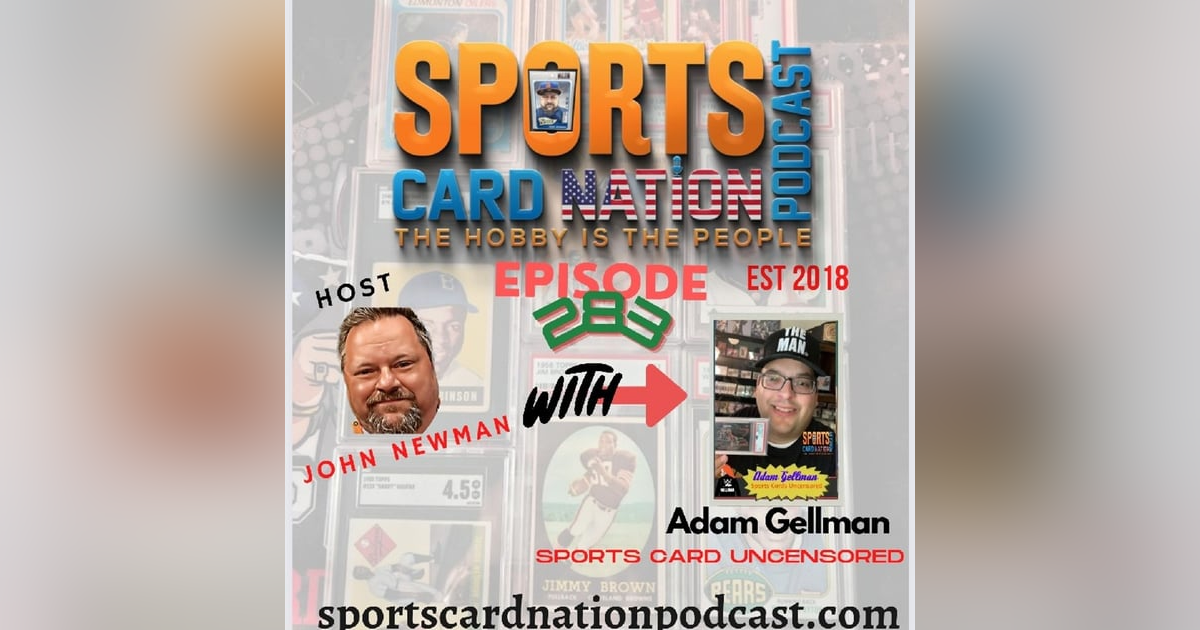
Sports Card Uncensored's Adam Gellman is our guest.
Topics:
*Collecting Minnesota's superstars
*Transitioning into Wrestling fulltime
*Wrestling Card market
Follow us on Social Media:
Website:
https://www.sportscardnationpo...
.com
https://linktr.ee/Sportscardna...
To eliminate pre & post-roll ads
https://www.spreaker.com/podca...
SPEAKER 1: What is up? Welcome to episode 283 Sports Car Nation. Back again.
SPEAKER 1: Today's guest, Mr Adam Gelman of Sports Card Uncensored has done a blog for many, many, many years. One of the, the ogs of the blogging hobby community and one thing I love about Adam, he does detective work, gets to the bottom of things. And the, the other thing I love about him is he doesn't mince words.
SPEAKER 1: Right. You don't have to guess what he thinks, he tells you exactly how he feels and, always appreciate those kinds of folks. So, glad to finally have a man. So, I think you enjoy, the conversation we, we touch on, on many topics. So with that being said, quick commercial break and we're back with Adam.
SPEAKER 2: Hobby Hotline is the hobby's only live interactive call in show.
SPEAKER 2: Join some of your favorite hobby personalities every Saturday 11 a.m. Eastern 8 a.m. Pacific to discuss the hottest hobby topics.
SPEAKER 2: If you miss us live. Catch us after the fact on all major podcast platforms. Follow us on socials at Hobby Hotline.
SPEAKER 3: All right. Happy to talk to my next guest on the Sports Card shop guest line. He's the creator and proprietor of Sports Card Uncensored, dot com. But he's also a collector. In a long time, he started, blogging in that website, in 2008, we're gonna talk to him about his collection, that website and all sorts of, hobby stuff. So, welcome my next guest, Adam Gelman. Welcome. Thanks man for having me on.
SPEAKER 4: I really appreciate it. I love, getting out and talk shop with people and, you know, just sort of having a good time talking about the hobby. It's always, it's always fun.
SPEAKER 3: It is always fun, right? The hobby is supposed to be fun. It's an outlet right? To the everyday things of life, that we do. And, I always say if you're not having fun, you got to reassess, right? What you're doing, you know, I've heard you on other programs or, or talking about.
SPEAKER 3: I know you, you mentioned, like your dad really kinda, you know, was in, in the TT M and, and getting autographs through the mail kind of back back before a, as you say before, it was a cool thing to do. He was doing it early, like sort of one of the, the, the originators. Was that something that did you do that? Did you kind of take his lead or, or that not necessarily.
SPEAKER 4: You know, I never really got into it. It was, it's kind of an interesting, same thing. Like, I mean, my dad was really into it and, and had, like, folders full of, like, these awesome, like, correspondences that he had had with different people.
SPEAKER 4: And I just never, like, I, I felt like, I graduated right into, like, the sort of the card space because it, like, when I was growing up collecting, you know, I was, you know, late eighties, early nineties was kind of like when I was, you know, 89 years old and, you know, going to card shows with my parents and, you know, that was always just the outlet for me.
SPEAKER 4: But I, you know, and before the strike happened in 94 for baseball, like, I was a huge baseball collector, love the twins and Kirby Puckett and everything and then the strike happened and I was just kind of like, this is stupid and I just kind of left for a while, but like, right when I went to college and, and came back, like, it, it all sort of like, bubbled back to the surface because I saw how things had change with.
SPEAKER 4: It's not just four sets a year anymore. It's kind of like this is now a a year long thing for every sport and there were autographs and stuff like that, which I really gravitated towards. So that was always my, my outlet.
SPEAKER 4: I never really did the whole, like, hey, I wanna write to everybody. I think that's really cool. The people that do cause I've seen people with awesome stuff that have come back and they send out stuff that they've had signed by a million people and it's really cool to see but I, I just never got into it like that.
SPEAKER 3: Yeah, I get it, I get it, you know, I did, I did a little bit of that, Adam, in, in my t late teens with my dad who grew up in, in Evans Field, in the Brooklyn Dodgers were originally from, from Brooklyn. So I have a lot. I have a Brooklyn Dodger autograph book on three by five index cards. Oh, that's cool as my dad does.
SPEAKER 3: And, you know, you got, we got letters and correspondence. It was like you said, it was pretty cool. Some of them actually wrote letters saying, hey, thanks for remembering it. Exactly here. I don't get too much mail anymore. Many of those, gentlemen are, are no longer with us, but it was, it was nice to have that moment and kind of make their day.
SPEAKER 3: Many of them said like that maybe their weak and, and, and that's cool. I know you, you, you know, you, you mentioned it, you collected a lot of like the Minnesota, superstars, your curry buck. It's Adrian Peterson's and, and, and, and those of, of those that I, I'm not a twins fan, but Kirby Puckett was probably one of my favorite non Mets players, if you will. That's, that's my team.
SPEAKER 3: I don't, I think he's underrated to this day. I don't think he gets, enough credit for the career he had.
SPEAKER 3: I know you've gotten, you know, you're, you're heavy into wrestling.
SPEAKER 3: And, and you, you mentioned that you got rid of that, you know, the, the other Sports, you, every baseball, football, how did you know? I, I guess my first question, why I, I think you touched on it already in, in your previous answer. But why did you do that? And how difficult was that to do? Yeah.
SPEAKER 4: So like I, I was collecting a lot of like, like I had a massive Vikings collection. I was a huge Minnesota Vikings collector, loved collecting all the new rookies. So like even up through like 2000, 2017 and 2018, like I was, I was still buying a lot like of, of the different cards.
SPEAKER 4: Ii, I love collecting Joe Mauer who is a Minnesota twins player just went into the Hall Of Fame. God, that was so cool. And like all of that was, was very important to me. And then it was just like, you know, I, I have a number of kids, they're all running around and like it was, it was hard to like, say, OK, I've got this huge stash of stuff that, you know, I, I don't really feel super passionate about anymore.
SPEAKER 4: And so, you know, my son sort of came to me and I, I've mentioned this on a couple of the other shows that I've done, like, you see, he wanted to get, he was watching it on YouTube, watching wrestling on YouTube.
SPEAKER 4: And I grew up, you know, in Minnesota, which is a huge wrestling town and then like going back to like the days of, you know, the A W A and, you know, Virag and all these other old wrestlers that, you know, really, were part of this area and the history of min soda. And so I grew up watching wrestling with my dad and my grandpa and everything.
SPEAKER 4: And then just the, grew up through the attitude era with like Stone Cold Steve Austin and the Rock and everybody in the Undertaker. And so, like, I really came of age in like the perfect time frame, but I also, like, went to college and my friends all loved it.
SPEAKER 4: We watched it in college too, came home and then kind of life happened and I, I let go of those types of, of things every day because I was working on, you know, Monday nights and whatever I didn't get to watch as much anymore. But my son, like, WWE has a huge, following on YouTube and my son is young enough that he's really into that he's, he's 13 and my oldest.
SPEAKER 4: And so it was very cool for him to, like, come and say, hey, like, let's watch WrestleMania. And that's really where we all got back into it. And, you know, it just sort of grew from there and, you know, my collection for a long time, like I saw the way that it was going on Social Media and everything through my website.
SPEAKER 4: I was covering it a lot through that too. And, you know, it just wasn't fun anymore. Like I would rip, you know, hugely expensive boxes of cards and get very little back. And only people in football that were worth anything were the quarterbacks.
SPEAKER 4: And, you know, if you've been, like, if you collected somebody that it wasn't like that, like your cards go up and down and stuff, I just didn't like that anymore. Wrestling was cheap. It was fun. And, so I got into it, my kids were, were into it and, and stuff.
SPEAKER 4: So that's kind of where it bloomed from there and, and now I've got, again, a very giant sort of collection and, you know, it's, it's really focused on sort of, and my site has shifted focus into like promoting this area of the hobby, which I think is, is super fun and, and I love the people around it. So, you know, it's just kind of reignited, that passion for me, real.
SPEAKER 3: Quick, just, again on. So how did you, did you, like, just sell all your baseball and football cards? Like, in one lot? Did you kind of piece it out? How, how did you move on from it, I guess.
SPEAKER 4: Yeah, I, I probably, I did it at like, the worst possible time too. So I sold everything in like 2019, which is like the year before everything blew up. So, if you go on to like my Instagram page and scroll all the way down to the bottom, you'll see my graveyard of regret.
SPEAKER 4: But like, you know, I had, you know, all these Patrick Mahomes rookies and Tom Brady's and autographs and I had, you know, Mike Trout and all of these guys and just hugely expensive cards. And I took them into a local shop who, because a lot of them were twins and Vikings.
SPEAKER 4: So like taking them to a local shop here makes sense because they can actually move the inventory. And so they just, yeah, they offered me one big price for it and I just handed it over and like I kept like a few things, but even after a few years, like by, by 2021 I'd even sold like the the pieces I held back because it's just like, I just didn't care as much about that part of my collection as much anymore.
SPEAKER 4: And we all move on like our tastes changed. So, you know, I became a lot more enthusiastic about the other stuff I was picking up and this was money that I could use to invest into that. So, that's kind of what I did.
SPEAKER 3: Yeah. No doubt. It makes sense. I get it. Right.
SPEAKER 3: We, I think anyone that's been in the hobby for any significant amount of time Adam has, has pivoted in some form of fashion. Right. I don't think we're, you know, I started when I was seven years old in 1979. My t, you know what I do now was vastly different obviously then.
SPEAKER 3: But even, even in my later, even in my twenties, what I do now is, is different than, than, and I think that's just, just, just, you know, par for the course if you will. So you have, like, if I said you, you show me a baseball football card, you wouldn't be able to do it.
SPEAKER 4: Nope, I don't, I don't really don't have any left.
SPEAKER 4: I, I actually, I do have like, one random, like bowman card sitting on my desk because I must have opened a blaster at some point in the last, you know, two years or whatever. But like, yeah, I just, I don't, I, and, but I was, I watch breaks, like, I watch breaks. I follow along really closely even though I don't own any of the cards anymore.
SPEAKER 4: Like, I still pay attention to everything. I'm on cart ladder constantly and, like, just looking at values and seeing where things are going. I follow all the people that, that do all that stuff. Plus, you know, a number of my friends who I've been able to associate with through wrestling cards, own shops.
SPEAKER 4: And so they, they have their own, sort of like, oh, this is going really well or this isn't going really well. So I still follow, very, very closely and cover a lot of it because it's still interesting to me. Like, the actual, like, coverage of the hobby is still very interesting to me, even if I'm not ready to spend money on the cards because it just, it's more, it's not part of my PC anymore.
SPEAKER 3: Yeah, we're, we're gonna get to the website. You, you kind of touched on it there too and I, I, I'll say this, you know, not that you can't report on the hobby and collect.
SPEAKER 3: I don't think, ii, I don't think the one's mutually exclusive of the other but the fact that you don't do baseball, football cards at this point, but can kind of report, hey, this is going on, be aware of this. I think it gives a little bit more credence to that. Like, hey, I don't have a dog in this fight. I'm just let you let you know, would you agree with that?
SPEAKER 4: I mean, it's, it's an interesting question because, like, I, I, we've had so many people come into the space in the last three years looking to, like, bring coverage to the hobby. And some of them have been, I, I say they've purchased credibility. Right. Because they've, they've come in with really high production values.
SPEAKER 4: Everything looks super clean and nice. And, you know, traditionally, like, hobby news coverage was always kind of like the, the conversations you had at the card shop that was, you know, surrounded by, you know, boxes like this high and stuff like that. So like, it was never really clean and, and easy and, and cool looking, right?
SPEAKER 4: It was always just kind of that grassroots type of coverage and now people coming in and doing these types of things all have like really cool sort of graphics and like they have a studio and like all these other things and they kind of like buy that credibility in because they're able to present their, their takes with, you know, this, this insane looking stuff.
SPEAKER 4: But there's also still those people out there who like me and, and you and others who really have taken. It's like, hey, I'm in my office or I'm in my bedroom or my basement and, you know, recording this and, and you know, that's kind of where it's still fun to see those regular people do it too.
SPEAKER 4: I mean, like it, it's not necessarily about the, the collecting that, that gives the credibility. It's really kind of the, the passion that you have about reporting it and, and, and understanding it.
SPEAKER 4: Right, because I think anybody can come in and read a bunch of books and, and read, you know, Social Media and read the blog post and, and feel like they have a good understanding. But until you've lived it and you've really been a part of it, it's hard to sort of report with that same level of passion as somebody who's more disconnected and sort of bought their way into it.
SPEAKER 4: I think that's what's really stood apart in a lot of these individuals who have come in. They, they don't feel like they're, they're one of us. Right.
SPEAKER 4: And that's, that's always been the problem and I think it's such a challenge to understand, like, how do we give those people the ability to be the voices of us as hobbyists, when we don't feel like they are one of us. Right. And it's, it's really tough to sort of marry those two things together.
SPEAKER 3: Yeah, that's, that's a great point. And, you know, I guess, teach their own. I call this my studio but like you said, it's a room in my house. Right. Exactly. Yeah, mine too. Yeah. Carpet, the carpet needs cleaning.
SPEAKER 3: There's like, you know, there's definitely a lot of room for improvement. Exactly here. What is organic and, and, you know, so, but iii, I, exactly, you know, I'm not in my head as you were, making your point here because it, it makes a lot of sense.
SPEAKER 3: Adam and, you know, I always say, listen, the hobby of fraternity, right? Whether you're like us and you've done it a while or you're fairly new.
SPEAKER 3: We're kind of in the same fraternity.
SPEAKER 3: But I, you know, one thing that bothers me a little bit if I have a pet peeve is maybe some of the new folks coming in who don't really care about how we got here. And that's always been a, a big thing for me is, is the hobby history. And, and the, hey, how do we get here?
SPEAKER 3: Like, I know we're here now and we live in the moment. And, and I get all that, but maybe because I'm old, maybe it's just a product of being, an older person. I care about how we got here. That this is not just a hobby thing, this is in world history, whatever, you know, business, industry. We're here because of what's happened before today.
SPEAKER 3: And so that's a big thing to me. So, when, when I hear someone who I don't, I, I don't expect people to know it. So I'm not gonna be, you know, critical of that, but when I sent someone, like, doesn't really care or po pos it or like, whatever.
SPEAKER 3: But, you know, that rubs me, you know, the wrong way a little bit because all that stuff is important if you're enjoying the hobby today, which I hope everyone is, you know, we have those that came before us to thank in, in some regard for, for where we are here, the good and the bad, right, of both sides of that coin.
SPEAKER 3: So that's one of my pet peeves. I've, I've talked about it before. It's just, you know, I get it if you don't know it but you, you know, you know, do a little research or, or find out about it and I think you're just even more smart. You can make up for a lot of lost time by knowing kind of how we got here.
SPEAKER 3: And, and, and that sort of thing. So that's my, that's a little, that's my little soapbox. If, if you will.
SPEAKER 5: You are listening to the Sports Card Nation podcast.
SPEAKER 5: We'll be right back after this break. Hobby News Daily is your home page of the hobby, providing original writing, exclusive gem rate data, a daily morning minute podcast and some of the best content creators in the hobby. Remember hobby News, daily.com and at Hobby News Daily on social Happy Collecting.
SPEAKER 3: We are back getting in the re, you know, you, you touched on it already kind of going full force, into wrestling, the preeminence, Becky Lynch collector. I'll, I'll let you speak more, to, to that wrestling, you know. Well, it's not on the same part, you know, as baseball, football, some of the major Sports if you will, wrestling, has made, a lot of strides.
SPEAKER 3: I think you'll agree with that. I think there's more people coming into the, the collecting space o of wrestling. But I heard you make a point, you know, that, because it's not on the same part as that you're able to get some really unique and cool pieces without the price levels that you see baseball, football, basketball and, and, and the other Sports and it's a great point.
SPEAKER 3: I, I guess, you know, I have you kind of elaborate on that. Do you ever, do you see that changing? Not that you collect for value? Right. I, I, you know, a lot of people, we all do.
SPEAKER 4: It's part of like the.
SPEAKER 3: Fun of it, right? Human nature, I think it's even human nature, right? If you open something and, and you get something that you perceive, hey, that's a, that's a nice card or that's a, a tough pull, right? You know, you say, hey, I wonder what that's going for. How did I do? You know, here's what I paid for the pack, the box, the case, whatever the case may be.
SPEAKER 3: What kind of measuring like was it worth it or? How did I, do you men, like even in baseball and football and opening? Believe me, I've been there too. It's why I don't open as much as I used to. But yeah, you may, you, you're right. People do care. But do you think with, with wrestling sort of becoming even more popular in the collecting side, do you think that will, will change or, or not necessarily?
SPEAKER 4: You know, it's interesting because like when the boom happened, like we, we saw, you know, everybody's inside, no one's spending money on vacations or meals out or any number of things. So they, they have a lot of disposable income to burn and a lot of them are putting it into crypto or they're putting it into cards or whatever.
SPEAKER 4: And that's where a lot of this really sort of took hold was we have money to spend. So we're gonna spend it on collectibles and things that make us happy and nostalgic. Right? Like, that's what dr it drove it so much. And so I think, like, what was different is the baseball and football and basketball.
SPEAKER 4: Like, they shot up, like, quickly wrestling was very much further behind and I think it's because it was always a really small niche. And, you know, there, there's been cards going back, you know, almost, you know, 100 years, right? Worth of wrestling cards.
SPEAKER 4: But like in the modern era of cards, like, I, it's been a lot different because the, the development of the products have doesn't match a lot of what we saw in the NBA and the NFL and MLB. And so I think as more people came in through the boom and, and started to recognize like, oh, I love this when I was growing up or I love, you know, being a part of this this community here, like that's where it really took off.
SPEAKER 4: And it's still not anywhere close, right? So, like it, the, the craziest thing happened with this most recent release, which just came out a couple of weeks ago. It was like one of the first time that a wrestling product cost as much as the football version of it.
SPEAKER 4: So, like that was something that was completely out of out of left field. And like, I think it was crazy to see like how much growth has really happened and how many people have really come in. And, you know, I, we, we was just talking about like, oh, I, I've collected since I was a little kid and blah, blah, blah, blah, the wrestling.
SPEAKER 4: I haven't, I've only been in it since like 2017, 2018, whatever. And so there are a lot of people who did come before me and did, you know, have big, you know, sort of collections coming into this. But because I was coming from a sport where everything was expensive now coming into wrestling and saying nothing is expensive.
SPEAKER 4: Like I went nuts like I was like, oh, this is easy like boom, boom, you know, picking stuff up. So, you know, it was easy for me to see like how much fun. It would be when you don't have to spend the kind of money to get the collection centerpieces and wrestling that you do in the NFL.
SPEAKER 4: And then they'll be like, just to get like a, a collection piece is like 50 bucks versus 500 bucks. Right. So, it's, it's really cool to, to, to see how that's gone. But the, the people too are so different and that's one of the main reasons I've stuck around is that they, we cheer for each other and we, we help each other and like, everybody collects like their one person or two people.
SPEAKER 4: And so you find those guys, you pull it out of a pack and you're like, oh, I know who would want this card and like, you know, stuff like that happens all the time.
SPEAKER 4: And if you look at some of the, the people that are out there doing this, on a regular basis for wrestling, like a lot of them have really deep roots in the community because it's so small and everybody knows each other and everybody knows that everybody's collection. So it's just, it's awesome to see a, a completely different side of things where, you know, prior to Panini coming in and taking over the WWE license.
SPEAKER 4: There were, you know, very different collecting goals than there were for the majority of the stick and ball Sports that are out there. Like now it's very much different because people have taken the Panini era and turned it, you know, around. So it's very similarly focused to now NFL and everything else.
SPEAKER 4: Like before, it was like, rookie cards were never a really big deal and now they're a huge deal. Like, it's, it's sort of turned on its head. But because we're able to draw those parallels between the, the Sports that we love, in the, in the other sides of the hobby. Now, in wrestling it's really easy to find value where there wasn't any before.
SPEAKER 3: Are you concerned that might change if more people continue to saturate the space? I mean, obviously you want the hobby to grow. I don't mean to do that.
SPEAKER 3: I don't, yeah, I don't want that to come across as a, but are you worried that one of the things that comes along with that might be escalating prices or, you know, you mentioned a great point because the space is, is tight knit and, hey, I know, I know a person that collects that. I just pulled it. I'll, I'll get it their way and, and vice versa.
SPEAKER 3: If they get something they know I would like, they would do the same thing for me. Are you a, are, are you, I don't know, fearful. Are you concerned that maybe if the space gets too big? Well, that's a good thing. But it could be like that, that, that loss of community.
SPEAKER 4: Yeah. I, I see what you mean.
SPEAKER 4: You know, I've, I've my entire Social Media presence for the last couple of years has just been about growing the space because, and there's, there's two ways to look at this. The first way is like if, if people come in and more people come in and the demand increases, but the supply is still the same prices go up. Right.
SPEAKER 4: That's just basic economics and no one wants to spend more money to get the stuff they want. But in the flip side of that, we all want the stuff we have to be more valuable because that's the whole point of, of, of, you know, in prestige in a lot of these areas. So I think it's a kind of a double edged sword because if more people come in and more people buy the products and the prices go up.
SPEAKER 4: The the theory is that the card companies will want to support that more with better products and more products and more variety and all those other things that go along with it, especially if it's a long term license, like we're seeing fanatics now lock up, you know, 20 year deals, whatever the idea is that in theory and in practice may be very different, but in theory, more people means more investment from them because they feel comfortable putting the money in.
SPEAKER 4: Now. Also, card prices have gone up dramatically, like in, in ways we've never dreamed it would happen. And I think that's always a challenge because as collectors, especially ones like me who are very impatient and want to get all their stuff as quickly as possible when it comes out.
SPEAKER 4: It, it prevents people from being at the front of the line. If they were there before, maybe you're now middle of the line, maybe you're at the back of the line. Maybe you're waiting 3 to 4 months to pick something up, but you would have picked up the first week before. Like those things are, are tough to internalize, right?
SPEAKER 4: It's tough to take those feelings and make sense of them without being bitter or you know, just angry about it. But I think if you have kind of a long term viewpoint and you say I really like the way that these products are going.
SPEAKER 4: We're getting better looking cards, we're getting better technology, better photos, more autographs, more cool types of things like that doesn't come without people around to support it. And I think it's really difficult to separate those two things because people just want to have access and access in the boom era has been removed almost completely from some people.
SPEAKER 4: And that's where breakers have come in and really sort of revolutionized the way people engage with these products. They're like, oh if I can shoulder the burden as a breaker and dole out slots at a fraction of the cost, the burden on the individual then becomes much smaller.
SPEAKER 4: That's why they arrived in an industry like this. But I think similarly, the access for just some dude to walk into a card shop and buy a box of cards just isn't the same as it used to be. And so when you remove access, you create negative sentiment and that's really been a challenging thing.
SPEAKER 4: I know for a lot of hobby personalities to, to make sense of. So if you can do a lot of those things and, and well play this balancing game that we're all terrible at, but we all want to do in our content like that is really the key here is like, how do you create balance in your collection and how do you create balance in your engagement?
SPEAKER 4: So you understand, hey, the manufacturer has to do Xy And Z, the collector has to do Xy And Z and the shop has to do Xy And Z and if all of those things act harmoniously, then things tend to go but get better.
SPEAKER 4: If one of those things falters then those, that leg of the stool gets kicked out, it's, it's hard to, to see a growth pattern that's positive versus just one that's hyper focused on the wrong areas. Right?
SPEAKER 3: Yeah, no doubt. I mean, like you said, so many, it's, it's so fluid. We've seen the, the license and licensing itself, Adam change hands between manufacturers, I guess. But I, I'll ask, you know, as someone in the space that collects wrestling, kind of your thoughts on that?
SPEAKER 3: Do you, are you, cautiously optimistic, with, you know, did you, would you rather see, you know, you, you mentioned something that I wanted to touch on too? Some of these licensing deals like you just pointed out are 20 years to me. That is a long time.
SPEAKER 3: As someone who's been married 25 years, I know that's, you know, I know it's till death do us part 25 years is a long time. 20 years is a long time when, when I hear these announcements, especially with the fanatics, you know, the first shoot to drop with, the Tops and, and baseball licensing.
SPEAKER 3: And I heard it was a 20 year deal, like it was shocking to begin with being a kid growing up in Brooklyn, New York and Tops was tops. Was the cats be out now the new company in the set owns though, like they're not going away. It's still at the five letters on the, on the, on the car, but it's not the original Tops, right? So that was shocking to.
SPEAKER 4: Separate that too. It's hard to separate.
SPEAKER 3: And then you hear 20 years and I'm like, why would anyone agree do a 20 year deal in business? Like when you, when, especially when at the time, you know, fanatics was not, they were a, a successful company but not in the cart space o of things. So you're giving someone who hasn't done, done it yet? 20 years. Kind of carte blanche. That really kinda bothered me.
SPEAKER 3: I just think that's wrong. Ii, I know there's out clauses and wording and contracts. But what, you know, to me, I'm like, do five or 10 years, but 20 years is, is, is too long. Kinda, I, I guess two pronged with the question. Kind of what I started. Like you, your thoughts on change in hand and then 20 years, you know, go ahead. So I, yeah.
SPEAKER 4: Yeah, I don't, I don't like exclusive licenses. I just, I've never liked exclusive licenses, players leagues, anything. Like I, I think it's so stupid but I understand why it happens. And, so I think licensing is changing hands is an inevitability, especially in an industry that's so profitable at the moment.
SPEAKER 4: Even with the downturn over the last year now, back, sort of bouncing back, like it's still been a very profitable industry. So it's not shocking that the, the battlegrounds have happened over the licenses, but I, I don't like them. I, I don't like that. That's the case. It shouldn't be the case.
SPEAKER 4: Like, I don't understand why people feel like there isn't enough room for multiple licenses to exist. And because there always has been prior to like 2007 and 2006, like that's really where all of this came to be, but it came to be because the card companies were, you know, little and they, like, the leagues just didn't want to deal with them.
SPEAKER 4: They're like, ok, if I can, if we can sign this exclusive deal, I don't have to deal with three different card companies. I can just deal with one and just get it out of there. Right. Like, it was very much a, an informational sort of, venture because you're just like, I just don't want to deal with this. Like, I want as few people that I have to appease as possible.
SPEAKER 4: So I don't like that, I don't like exclusive licenses, but I understand from a cart company perspective especially now why it's so vital to the success of their business. Now you ask, why is there a 20 year deal? And why is fanatic, why was fanatics given this sort of carte bludge approach to be able to just go in and, and go forth and multiply?
SPEAKER 4: Right? And the reason is because the leagues all have equity in fanatics. So like if you think about this from a business where relationship standpoint, MLB and NFL and NBA all own part of the fanatics business and they want it to be successful.
SPEAKER 4: So I believe I if I'm thinking about this correctly, Michael Rubin probably went in there and said, like I may not have the infrastructure built, but I do have a retail sort of infrastructure built. I have a distribution infrastructure built. The only thing I need is the cards themselves and I can buy somebody to do that for me, which they did.
SPEAKER 4: So, I, I don't think that that was ever really a concern for the leagues because the leagues are just like, yeah, like we do our, you know, all of our licensing through you for clothing and whatever. Like, sure why, why not do cards too and they own part of the business.
SPEAKER 4: So, fanatic success is equally the success of the leagues. That's why they've done this for such a long period of time. Now. Panini and Ta and upper deck are probably thinking, well, this feels monopolistic and we want, we don't want that to be the case and they've sued over it.
SPEAKER 4: I, I just don't see a future where it's not exclusive anymore.
SPEAKER 4: And that's really unfortunate for everybody but the manufacturer now they will try and come and say, oh, it will allow us to invest in all those things. I was talking about my previous answer.
SPEAKER 4: But in reality, like competition, historically breeds innovation and like it, it really is a key element to driving a, a really big growth period in any industry where, you know, these things have been a lot around as long as cards have like, you know, cards have been around since before world war one and even into the 18 hundreds, like, that's a huge length of time that a product has been available to the public.
SPEAKER 4: So I I think there needs to be a constant innovation, especially with the growth in technology to support it. Now. It from a like a wrestling for perspective. Like it, it like, I am really indifferent to who makes the cards as long as they get made because Tops does a good job. Panini does a good job.
SPEAKER 4: Like they both have really good products. Like I think there's very little in between in those gray areas that really exist that tell me one company won't do better than the other. Like, I think it would be great if they both could, it would be great if three companies could, but I just don't see that happening.
SPEAKER 4: And I, I really feel like when they say 10 X the hobby that's always kind of the meme that's going around. Like, I don't think that's gonna happen. Like, I, I do, like, it's, it would take another, you know, sort of shocking event for that to really be the case.
SPEAKER 4: But, you know, I think fanatics will probably do a good job but, you know, they, they haven't really done a good job in other areas of their business. Right. They have constant with their clothing and other licensed products. Like I am not a fan of their company overall when it comes to that side of it. I love the tops company.
SPEAKER 4: I think the people at tops do a great job, but I think they're being under a corporate banner. Makes it a difficult transition. And you, you, like you said, like, it's still the same five letters on the front of the card, but it's not like they're, they're approaching it in a very different way.
SPEAKER 4: And so I think that's where a lot of collectors are gonna see major changes happen, especially as 2026 rolls around and fanatics starts to cover everything like you are going to have wholesale changes that we haven't even begin to think of yet. They own so many different pieces of everything that it's hard not to imagine everything changing.
SPEAKER 3: Yeah, no doubt. Great point. I, I, what you said, I, I probably agree with the 99 if not 100%. Adam, it's, you know, I get it. We're probably, we've seen the, the end of like, multiple companies producing one sport, although I'd love to see it. Yeah, I agree with what you said.
SPEAKER 3: When you said, when we've seen that, I think it brings out the, the competition value, of each company competing against each other. Like, hey, we can make a better product than company b and here's how we're doing it. It creates innovation. As you said, the sad part is, I don't think we'll, we'll really see that again, at least with the, probably the major Sports, but you make another great point.
SPEAKER 3: The reason why, right. It's financial. Now you have the leagues eating at the same table as the manufacturers never happened before. It always felt like, you know, tops and, and, and maybe this is kind of a harsh way of saying it was like the parent and the sport was sort of the kid and now it's, it's, they're at the same, they're at the, you know, they're not at the kids' table anymore.
SPEAKER 3: The Sports themselves, they're, they have an equity stake, as you said, their, their, their, their hands in the pie as well, which allows fanatics to say we're gonna do this and let you get a, a good portion of that pie. This deal has to be long term. We have to feel like you're in it with us for the long haul too.
SPEAKER 3: If we're gonna give you more, more say and more, more power than, than ever before. So if you hit it right on the, on the head, you know, but again, I'd love to see multiple companies make retail these cards because I think number one, it gives us choices, right as consumers and that's how choices are a good thing, right?
SPEAKER 4: And and there's enough of us now that we can support those choices, right?
SPEAKER 3: Yeah. Yeah. And it brings out the competition like, hey, remember when you know, company a did this last year, we got kind of up the ante.
SPEAKER 1: Awesome talking to Adam. Appreciate him making some time for the show. Check out his site. Sports Card, uncensored. He calls it like he sees it and this was, part one. We're gonna come back next week and conclude our conversation, with Adam. So, we're gonna hear from our hobbies. The people announcer. He had some closing thoughts before we wrap up this week's episode.
SPEAKER 6: Time for our hobby is the people announcer of the week.
SPEAKER 7: This is Ray from Philly. And remember the hobby is the people.
SPEAKER 6: If you'd like to be the hobby is the people announcer of the week. Do a WAV or MP3 file and send it to Sports Card Nation BC at gmail.com.
SPEAKER 8: That's a wrap for this week. Huge. Thanks to you, the listeners out there because without you, there is no ice.
SPEAKER 8: If you like the show, we truly appreciate positive reviews. Big ups to our great guests who drive the show and our awesome sponsors who make it all possible. Sports Card Nation will be back next week, but don't forget to catch either hobby quick hits or cod mentions coming up on Monday.
SPEAKER 8: I'll leave you with this.
SPEAKER 8: How do we change the world?
SPEAKER 8: One? Random act of kindness at a time.
SPEAKER 8: Remember the hobby is the people.
SPEAKER 9: Iron Sports Cards is your number one source for all your PS A and other grading submissions. Their elite status improves turnaround times. Heck, they even provide the card savers. Their chat rooms, provide updates on all your submissions.
SPEAKER 9: They also offer wax options and single cards to cover all the bases. Check them out on Facebook at Iron Sports Cards Group or on the web at Irons Sports cards.com or even give them a call at 1877. Ironps A Rob's got you covered for nearly 50 years.
SPEAKER 10: Sports collectors digest has been the voice of the hobby. Bringing you comprehensive coverage of the Sports collectible industry from industry news, auction results, market analysis and in depth stories about collectors and their collections. Sports collectors digest has everything you need to know about.
SPEAKER 10: The hobby. S CD is also your leading source for listings of Sports collectible dealers, card shops, card shows and the latest from the industry's top companies to check out all the latest news or to subscribe to the hobby's oldest magazine. Visit Sports collectors, digest.com or call 1 808 29, 5561.








